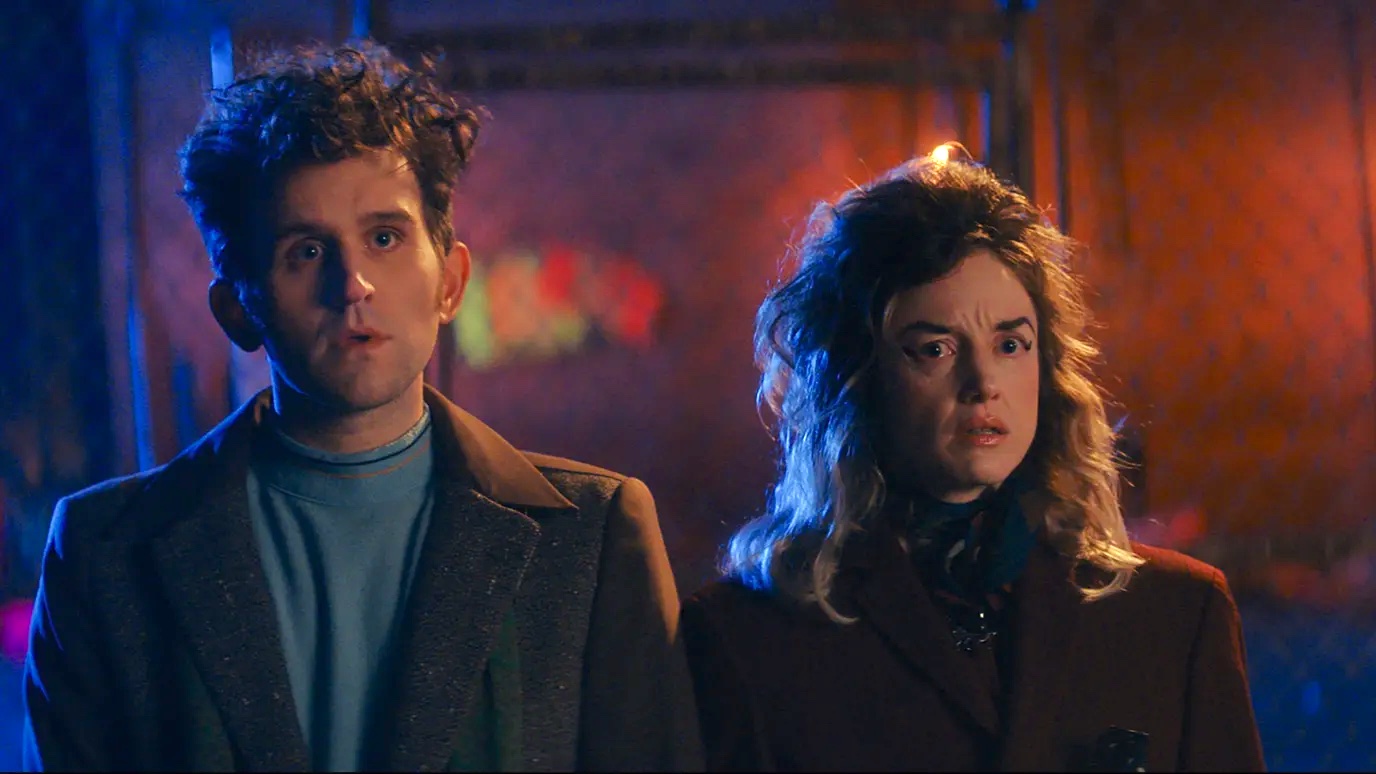In Amanda Kramer’s (Ladyworld) brilliant new film, Please Baby Please, a husband fixes a chair while his wife stares at a pile of dirty dishes. The wife has pink dish gloves in her hands, but she tosses them to the ground. The husband, however, is not yet ready to let go of his screwdriver. The film is set in the 1960s, so we know that it is firmly established which gender should wield which item. A wife throwing those pink gloves down is an act of rebellion, reflective of the liberation movement happening at that time. The act of a husband not being able to throw down the screwdriver, emphasizes the tightly strung definition of what a man is and how he’s supposed to act.
Please Baby Please is a manifesto of liberation, gender fluidity and embracing queerness. The film is an engrossing tale of self-discovery that applauds the evolving nature of human beings—the title, Please Baby Please, acting as both a request for pleasure and a cry for freedom.
The film, Kramer’s third feature, opens like a musical. A gang that resembles Grease’s T-Birds, (but has the moves of West Side Story’s Jets), shimmies down a dimly lit alleyway to a smooth, sensual sax that will remain as the film’s soundtrack. This sequence isn’t all song and dance, though, as the gang beats two people to death on a young couple’s stoop. The couple, Arthur (Henry Melling) and Suze (Andrea Riseborough), witness the crime; their shocked faces meet the sneers of the gang. Arthur is surprised by the sexual tension between him and a member of the gang, while Suze is surprised to learn she’s turned on by the violence.
The disturbing crime kick-starts a transformation for the couple. As they gather with friends to process what just happened, Suze comments that Arthur would never be that physical, igniting a conversation about her husband’s masculinity.
“If you’re not a man, what are you?” one character asks. Arthur corrects him: “I am a man. I just don’t feel the need to act male.”
The reflection, along with a budding crush on another man, eventually lead to him exploring his queerness. A hug between him and his crush is overlaid with a scene of a straight couple dancing. This piece of himself isn’t one that society would accept, but he has the bravery to acknowledge it anyway.
Suze also experiences her own self-discoveries. Domesticity is a prison, and in the 1960s of the film, everything a housewife does is dictated by her husband’s desires. But women have their own desires, and Suze wants more in life than the job of making her husband happy. When she meets her eccentric upstairs neighbour Maureen (Demi Moore), Suze’s views on sex and a wife’s role change. Maureen describes herself as a wife, but not a “wifey;” she has a freedom that Suze does not. She has porn magazines that she discusses with an air of rebelliousness. Her apartment is flooded with appliances that her husband buys to satisfy her—essentially, she’s surrounded by big vibrators. Films and television shows taking domestic appliances and turning them into tools for sexual pleasure is nothing new (think Betty Draper from Mad Men and the washing machine), but here it’s taken to the next level. Suze’s BDSM urges come out through dream sequences that include a member of the gang burning her ass with a clothes iron. She takes pleasure from the pain, but just like Arthur’s queer desire, her sadomasochism must be kept to herself.
The casting of Melling and Riseborough as a couple feels random, but it works. They move together with an alluring rhythm as their roles shift throughout the film. It’s interesting to watch how their style and behaviour change as they embrace their masculine and feminine sides, respectively. As Arthur dances, Suze puts on a gang member’s jacket—their transition into their true selves coming full circle by the end of the film.
Riseborough brings a playful spunkiness to Suze that complements her bold eyeliner and costumes. And Melling delivers an affecting performance that’s full of dramatic moments, capturing Arthur’s internal conflict with a forceful impact. As he spits at his own reflection in a mirror in one scene, you can feel his self-disgust.
Please Baby Please is an orgasmic burst of colour. Drenched in blue and red lighting for much of the film’s run-time, the lighting excellently blends those colours slowly into purple to emphasize its queer themes,as Arthur and Suze reach their arcs. At times, it feels like the film tries to touch on too many things, losing both its focus and the focus of the audience. But overall, it’s an introspective discussion that hammers home our individuality. Suze tells Arthur that they’ve “played [their] parts [their] whole lives.” And as we’ve learned, no one grows to have just one part to play.


 Why you can trust Xtra
Why you can trust Xtra


